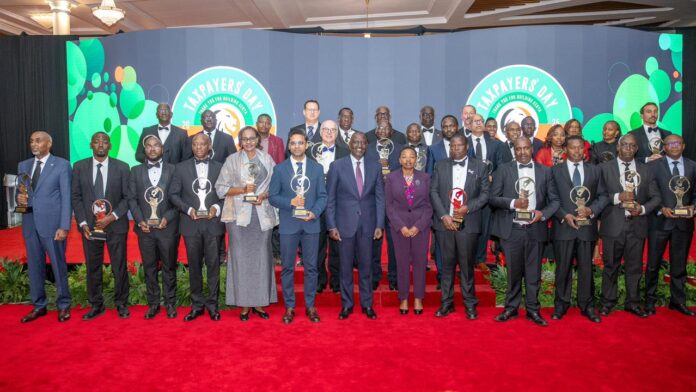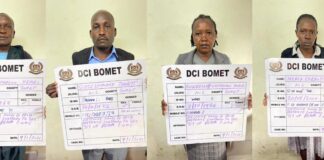By John Mutiso
President William Samoei Ruto, has reaffirmed his government’s commitment to supporting the Kenya Revenue Authority (KRA) with the policies and resources needed to innovate, simplify processes, build public trust, and serve taxpayers more efficiently.
Speaking during this year’s Taxpayers’ Day celebrations held at State House, Nairobi, the President noted that KRA has made significant progress in innovation, highlighting that Kenya is among the earliest countries in Sub-Saharan Africa to integrate AI-powered risk engines into tax compliance, a development that places the nation at the frontier of modern public administration.
“The Customs Department recently recorded its highest-ever monthly customs revenue, KSh 85 billion last month, following the piloting of these engines and the re-engineering of our processes. Domestic VAT collections have also strengthened, rising from KSh 20 billion per month in the 2021/22 financial year to KSh 28 billion today,” said the President.
President Ruto emphasized that KRA has been central to advancing Kenya’s economic sovereignty, noting that revenue collection has increased 21-fold, from KSh 122 billion in 1995 to KSh 2.57 trillion in the 2024/2025 financial year.
“The revenue collected has built our schools and hospitals, powered our infrastructure, and strengthened our sovereignty. We are steadily on track to hit the KSh 3 trillion mark this financial year,” he added.
The President urged all taxpayers to contribute their fair share, describing tax compliance as an act of patriotism and a vital contribution to nation-building.
“Paying taxes is not merely a legal obligation, it is an act of patriotism and solidarity, a collective commitment to the Kenya we aspire to build. Taxpayers must see value for their contribution, and every public institution must operate with transparency and integrity. Every shilling collected must deliver visible results,” he affirmed.
Cabinet Secretary for the National Treasury and Economic Planning, Hon. John Mbadi, reiterated that revenue collection remains a central priority in financing the country’s development agenda.
He said the government will continue leveraging technology to modernize the tax framework, seal revenue leakages, and enhance overall system efficiency.
“Innovation is essential for improving the fairness and effectiveness of our tax system. Technology will also help us broaden the tax base so that every Kenyan contributes their fair share. When everyone pays something, no one feels punished, but when only a few pay taxes, even the compliant ones start looking for the exit,” said CS Mbadi.
KRA Board Chairman, Hon. Ndiritu Muriithi, stated that the Authority’s transformation agenda is anchored on transparency, innovation, and good governance.
“Guided by the 9th Corporate Plan, we are overseeing KRA’s strategic transition from an Authority to a Service, a transformation that reflects a deeper commitment to customer-centricity, accountability, and public trust. This shift heralds a renewed culture of service, partnership, and responsiveness to the needs of every taxpayer,” he said.
On his part, KRA Commissioner General, Mr. Humphrey Wattanga, noted that KRA is redesigning its services around the citizens to ensure that registration, filing, payment, and customer support can be accessed conveniently, securely, and without unnecessary bureaucracy.
“Today, a Kenyan can file returns through a simple USSD code 2225#, no smartphone needed. And because millions rely on WhatsApp daily, we have taken our services to that platform as well. These innovations mean something profound: we are opening virtual KRA offices in every taxpayer’s pocket,” he added.
During this year’s Taxpayers Day Awards, KRA recognized various institutions and individuals for their exemplary commitment to tax compliance.



















